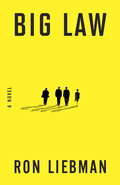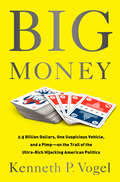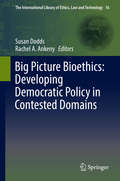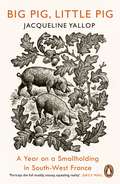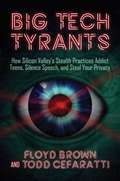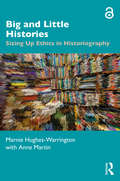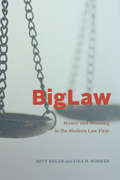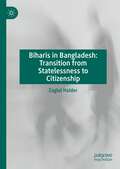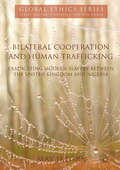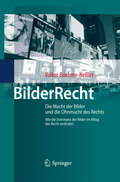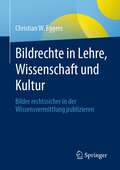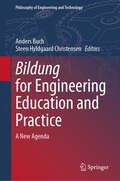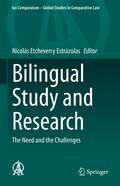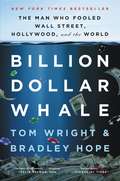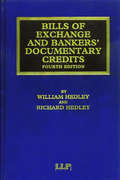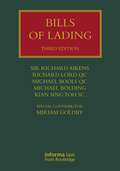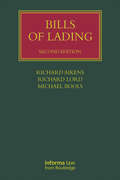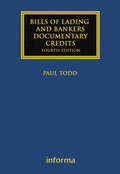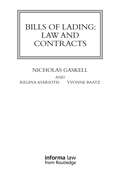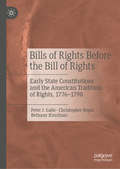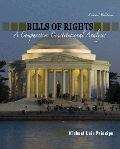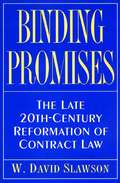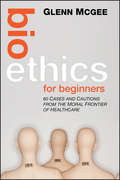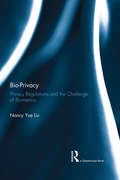- Table View
- List View
Big Law: A Novel
by Ron Liebman“Big Law has it all. A locomotive drive, a fantastic, appealing, big-hearted narrative voice, and an inside and very entertaining look at the intersection of big law and big business. Smart and truly unputdownable.” —John Lescroart As a young partner at Dunn & Sullivan, one of New York's most prestigious law firms, Carney Blake has represented dozens of high-profile clients. But being a pawn of Big Law often means defending the corporate dirt bags of the world—the spillers, the drillers, and the killers. Morality aside, Carney is starting to make a name for himself, despite having a father who resents his success and an unpredictable big brother bent on self-destruction. So when Carney is suddenly asked by his firm's chairman to represent the plaintiffs in a class action lawsuit—and not, as usual, the corporate bad guys—he warily accepts. Maybe they're turning a corner, he thinks. And even if they aren't, when else has a junior partner been assigned such a major case, with a possible billion dollar payout? But Carney can't fool himself for very long. As he digs deeper into the case, he uncovers corruption and maliciously orchestrated schemes that go straight to the top of Dunn & Sullivan—along with the true motives behind his placement on the case. Written by former top litigator Ron Liebman, Big Law is a thrilling, fast-paced roman à clef that exposes the secrecy, deception, and machinations underlining America’s most powerful mega-firms.
Big Money: 2.5 Billion Dollars, One Suspicious Vehicle, and a Pimp-on the Trail of the Ultra-Rich Hijacking American Politics
by Kenneth P. VogelMark Hannauthe turn-of-the-century iron-and-coal-magnate-turned-operative who leveraged massive contributions from the robber baronsuwas famously quoted as saying: oThere are two things that are important in politics. The first is money, and I canOCOt remember what the second one is. OCO To an extent that would have made Hanna blush, a series of developments capped by the Supreme CourtOCOs 2010 Citizens United decision effectively crowned a bunch of billionaires and their operatives the new kings of politics. "Big Money" is a rollicking tour of a new political world dramatically reordered by ever-larger flows of cash. Ken Vogel has breezed into secret gatherings of big-spending Republicans and Democrats alikeufrom California poolsides to DC hotel barsuto brilliantly expose the way the mega-money men (and rather fewer women) are dominating the new political landscape. Great wealth seems to attach itself to outsize characters. From the casino magnate Sheldon Adelson to the bubbling nouveau cowboy Foster Friess; from the Texas trial lawyer couple, Amber and Steve Mostyn, to the micromanaging Hollywood executive Jeffrey Katzenberguthe multimillionaires and billionaires are swaggering up to the tables for the hottest new game in politics. The prize is American democracy, and the playersOCO checks keep getting bigger.
Big Picture Bioethics: Developing Democratic Policy in Contested Domains (The International Library of Ethics, Law and Technology #16)
by Susan Dodds Rachel A. AnkenyThis book addresses the problem of how to make democratically-legitimate public policy on issues of contentious bioethical debate. It focuses on ethical contests about research and their legitimate resolution, while addressing questions of political legitimacy. How should states make public policy on issues where there is ethical disagreement, not only about appropriate outcomes, but even what values are at stake? What constitutes justified, democratic policy in such conflicted domains? Case studies from Canada and Australia demonstrate that two countries sharing historical and institutional characteristics can reach different policy responses. This book is of interest to policymakers, bioethicists, and philosophers, and will deepen our understanding of the interactions between large-scale socio-political forces and detailed policy problems in bioethics. asdf
Big Pig, Little Pig: A Year on a Smallholding in South-West France
by Jacqueline YallopAs heard on BBC Radio 4's Book of the Week'A delightful and entertaining memoir' Woman and HomeWhen Jacqueline moves to south-west France with her husband, she embraces rural village life and buys two pigs to rear for slaughter. But as she gets to know the animals better, her English sentimentality threatens to get in the way and she begins to wonder if she can actually bring herself to kill them. This is a memoir about that fateful decision, but it's also about the ethics of meat eating in the modern age, and whether we should know, respect and even love the animals we eat. At its heart, this book is a love story, exploring the increasing attachment of the author for her particular pigs, and celebrating the enduring closeness of humans and pigs over the centuries.
Big Tech Tyrants: How Silicon Valley's Stealth Practices Addict Teens, Silence Speech, and Steal Your Privacy
by Floyd Brown Todd CefarattiThey are driven without respect for the lives they are changing…“Boy Kings,” or Big Tech Tyrants, are considered the most powerful individuals in the world. They’re the autocratic aristocrats who run the tech giants in Silicon Valley, and if the labels are accurate, they suggest these social platform operators have gained a non-elected (or, should we say, a self-elected) authoritarian power. They wield it with more effectiveness and precision than any sitting government or military strategist. Big Tech Tyrants boast riches beyond emperors of old but act like juveniles who don’t want to grow up. They are modern-day robber barons. Big Tech Tyrants don’t know the meaning of privacy, when it comes to you. They try to make you believe they will give their products away for free as a service to society, when really, they are vacuuming your personal data. They use this data to discover your deepest secrets. Are you or your partner trying to get pregnant? Are you underwater financially? Are you having an extramarital affair? Do you have a tidy nest egg? Are you a Trump supporter? Are you a Bernie Sanders follower? Are you a Scientologist, Mormon, Christian, or Buddhist? Your personal data is extremely valuable to them—and they use it—and abuse. These tyrants knowingly addict users to make more money. Not only that, they also consider themselves the most enlightened the world has ever seen—so they know what’s best for you to see—from the news and information you read to the political candidates they think you should vote for. They censor news and only let you see what they want you to see. This is an eye-opening must read for anyone living in the twenty-first century!
Big and Little Histories: Sizing Up Ethics in Historiography
by Anne Martin Marnie Hughes-WarringtonThis book introduces students to ethics in historiography through an exploration of how historians in different times and places have explained how history ought to be written and how those views relate to different understandings of ethics. No two histories are the same. The book argues that this is a good thing because the differences between histories are largely a matter of ethics. Looking to histories made across the world and from ancient times until today, readers are introduced to a wide variety of approaches to the ethics of history, including well-known ethical approaches, such as the virtue ethics of universal historians, and utilitarian approaches to collective biography writing while also discovering new and emerging ideas in the ethics of history. Through these approaches, readers are encouraged to challenge their ideas about whether humans are separate from other living and non-living things and whether machines and animals can write histories. The book looks to the fundamental questions posed about the nature of history making by Indigenous history makers and asks whether the ethics at play in the global variety of histories might be better appreciated in professional codes of conduct and approaches to research ethics management. Opening up the topic of ethics to show how historians might have viewed ethics differently in the past, the book requires no background in ethics or history theory and is open to all of those with an interest in how we think about good histories.
BigLaw: Money and Meaning in the Modern Law Firm (Chicago Series in Law and Society)
by Mitt Regan Lisa H. RohrerThe Great Recession intensified large law firms’ emphasis on financial performance, leading to claims that lawyers in these firms were now guided by business rather than professional values. Based on interviews with more than 250 partners in large firms, Mitt Regan and Lisa H. Rohrer suggest that the reality is much more complex. It is true that large firm hiring, promotion, compensation, and termination policies are more influenced by business considerations than ever before and that firms actively recruit profitable partners from other firms to replace those they regard as unproductive. At the same time, law firm partners continue to seek the non-financial rewards of being members of a distinct profession and are sensitive to whether their firms are committed to providing them. Regan and Rohrer argue that modern firms responding effectively to business demands while credibly affirming the importance of non-financial professional values can create strong cultures that enhance their ability to weather the storms of the modern legal market.
Biharis in Bangladesh: Transition from Statelessness to Citizenship
by Zaglul HaiderThis book deals with the citizenship status of the Biharis in Bangladesh and their ability to access rights associated with citizenship. The main argument of the book is that although legally the Biharis are citizens of Bangladesh, they still do not have access to many important rights of citizenship that can make their citizenship meaningful. Their inability to access many important citizenship rights made them de facto stateless, although they are de-jure citizens. Taking a law and society approach this book examines both legal and non-legal factors behind the deplorable conditions of the Biharis in Bangladesh. Based on fieldwork, this book analyses that the Biharis’ inability to access citizenship rights is inconsistent with citizenship theory, citizenship laws, and the Constitution of Bangladesh. To make the Biharis citizenship effective or meaningful the author suggests some recommendations for policy changes that would enable Biharis to access rights associated with citizenship.
Bilateral Cooperation and Human Trafficking: Eradicating Modern Slavery between the United Kingdom and Nigeria (Global Ethics)
by May IkeoraThis book presents a case study of human trafficking from Nigeria to the UK, with a focus on practical measures for ending this trafficking. The study addresses the many aspects of human trafficking, including sexual exploitation, domestic servitude, labor exploitation, benefit fraud, and organ harvesting. Despite the huge investment of the international community to eradicate it, this form of modern day slavery continues, and the author urges stakeholders to focus not only on criminals but also on attitudes, cultures, laws and policies that hinder the eradication of modern slavery.
BilderRecht: Die Macht der Bilder und die Ohnmacht des Rechts Wie die Dominanz der Bilder im Alltag das Recht verändert
by Volker Boehme-NeßlerWir leben in einer Bilderwelt. Die Folgen sind - im wahrsten Sinn des Worts - unübersehbar. Was bedeutet die Dominanz der Bilder für das Recht? Bisher ist das Recht sehr bilderskeptisch. Das wird kaum so bleiben können, denn wenn sich ein Recht zu weit vom Leben entfernt, wird es über kurz oder lang an Bedeutung verlieren. Welche Chancen und Risiken ergeben sich, wenn Parlamente, Verwaltungen, Gerichte und Anwälte visuell kommunizieren? Der Autor diskutiert die Frage, wie ein BilderRecht aussehen könnte.
Bildrechte in Lehre, Wissenschaft und Kultur: Bilder rechtssicher in der Wissensvermittlung publizieren
by Christian W. EggersBildliche Darstellungen sind ein wichtiger Bestandteil in der Wissensvermittlung. Bildnutzungen zur Lehre, Bewahrung der Kultur und der Forschung sowie der Wissenschaft unterliegen besonderen Regelungen durch das Urheberrecht. Unter welchen rechtlichen Voraussetzungen können Grafiken, Videos und Fotos von Lehrenden und den Mitarbeitenden der Einrichtungen zur Wissenschaft und Kultur publiziert und zur Kommunikation verwendet werden? Welche Reglungen gelten bei der Nutzung fremder Werke in wissenschaftlichen Arbeiten? Hierauf gibt dieses Buch Antworten. Im Zuge der 2018 neu geschaffenen urheberrechtlichen Regelungen zur „Wissensgesellschaft“ und zuletzt mit der 2021 Geltung erlangten Urheberrechtsreform ergeben sich eine Reihe von rechtlichen Erleichterungen und Klarstellungen bei der Nutzung von Grafiken, Videos und Fotografien. Insbesondere wurden Regelungen für die digitale Kommunikation im lehrenden und wissenschaftlichen Kontext neu geschaffen und ergänzt. Dieser Ratgeber zum Urheberrecht richtet sich vor allem an Publizierende, die Grafiken, Videos und Fotos zum Zwecke der Forschung, Lehre und zur Außendarstellung kultureller Einrichtungen nutzen. Damit dient das Buch als Wissensressource in der praktischen Arbeit der Mitarbeitenden der Universitäten, Museen, Bibliotheken sowie Forschungsstellen und den Archiven zur Bewahrung von Kulturgut.Mit der Entwicklung der Wissensgesellschaft steigt das Bedürfnis der publizierenden Einrichtungen aus Kultur, Wissenschaft und Lehre Werke der Bildung und Kultur über das Internet der Allgemeinheit frei zur Verfügung zu stellen. Einen weiteren Schwerpunkt dieses Buches bilden daher die urheberrechtlichen Fragen von Publikationen unter Open-Science-Bedingungen
Bildung for Engineering Education and Practice: A New Agenda (Philosophy of Engineering and Technology #49)
by Steen Hyldgaard Christensen Anders BuchUsing the concept of Bildung as a framework, which in late capitalism/postmodernity may be perceived to include critical knowledge, value consciousness, ethics, and social responsibility (including sustainability), this project aims to investigate the underlying aspirations, structures, and dynamics of change taking place in engineering education and practice through conversations between engineering, social sciences, and the humanities. Calling upon the spirit of philosophers on Bildung such as John Dewey, Jürgen Habermas and contemporaries, the focus of the present project is on broadening engineering education initiatives and practice that follow normative understandings of Bildung. This volume appeals to researchers and students working in philosophy, engineering, and education.
Bilingual Study and Research: The Need and the Challenges (Ius Comparatum - Global Studies in Comparative Law #58)
by Nicolás Etcheverry EstrázulasThis book addresses the importance of bilingualism in legal education. Written by respected experts in the field, it presents reports on bilingual legal education in countries with such diverse cultures and histories as Belgium, Canada, China, the Czech Republic, Finland, France, Germany, Italy, Japan, Mexico, Romania, Singapore, Taiwan and the USA. The findings are also summarized in a General Report that was presented at the 20th IACL General Congress in Fukuoka, Japan.
Billion Dollar Whale: The Man Who Fooled Wall Street, Hollywood, and the World
by Tom Wright Bradley HopeThe definitive inside account of the "extraordinary" (Financial Times) 1MDB scandal, "a true life thriller" (Ben Mezrich) about a "modern Gatsby" who managed to swindle over $5 billion with the aid of Goldman Sachs and others--a "must read" (Booklist) "epic tale" (Publishers Weekly) that exposes the secret nexus of elite wealth, banking, Hollywood, and politics from two award-winning Wall Street Journal reporters. <P><P>In 2009, with the dust yet to settle on the financial crisis, a baby-faced, seemingly mild-mannered Wharton grad began setting in motion a fraud of unprecedented gall and magnitude--one that would come to symbolize the next great threat to the global financial system. His name is Jho Low, a man whose behavior was so preposterous he might seem made up. <P><P> An epic true-tale of hubris and greed, Billion Dollar Whale reveals how this young social climber pulled off one of the biggest heists in history--right under the nose of the global financial industry. <P><P>Federal agents who helped unravel Bernie Madoff's Ponzi scheme say the 1MDB affair will become the textbook case of financial fraud in the modern age--and its fallout is already being credited for taking down the prime minister of Malaysia. With his yacht and private jet reportedly seized by authorities and facing money-laundering charges in Malaysia, an Interpol red notice, and an ongoing U.S. Department of Justice Investigation, Low has become an international fugitive. <P><P>For readers of Liar's Poker, Den of Thieves, and Bad Blood, Billion Dollar Whale will become a classic, harrowing parable about finance run amok. <P><b>A New York Times Bestseller</b>
Bills of Exchange and Bankers' Documentary Credits
by William Hedley Richard HedleyBills of exchange and bankers' documentary credits are the fundamental financial instruments and mechanism of settlement for international trading transactions. Bills of Exchange and Bankers' Documentary Credits, 4th Edition provides a highly readable, yet in-depth account of the law and practice relating to bills of exchange, cheques and bankers documentary credits. The authors explain how the Bills of Exchange and other instruments work in practice, drawing particular attention to the problems which are likely to arise and how best to resolve them. Furthermore, because the parties to financial transactions are often based in different countries, it deals with jurisdiction and choice of law to enable you to make the most informed and profitable choices.
Bills of Lading (Lloyd's Shipping Law Library)
by Sir Richard Aikens Richard Lord QC Michael Bools QC Michael Bolding Kian Sing Toh SCBills of lading form an essential part of the carriage of goods by sea and international trade. Their multi-functional nature, together with the large volume of case law and regulation, make the law in this field as complex as it is commercially vital. This bestselling book, now in its third edition, provides a detailed analysis of the law and practice applicable to bills of lading before, during, and after shipment, helping today’s busy practitioner to quickly and easily find the information they need. This book has been fully revised and updated with all the major developments, including: reference to increasingly important Singapore and Far-Eastern decisions; an analysis of modern developments in seaworthiness, from vetting and approval clauses to the topical issues of vulnerability and piracy attacks; detailed examination of misdelivery, fraudulent or forged bills of lading, and delivery without production of a bill of lading; revised coverage of conflicts and procedural matters, including anti-suit injunctions, jurisdiction battles, and the scope of arbitration; reference to relevant European law relating to issues of jurisdiction and procedure; comprehensive treatment of switch bills, transhipment, house bills, deck carriage, and container cargo; and new material on the practical implications of electronic bills of lading, and the implications of automated vessels. This text continues to provide an indispensable reference for maritime practitioners and institutions worldwide.
Bills of Lading (Lloyd's Shipping Law Library)
by Richard Lord Richard Aikens Michael BoolsBills of Lading form an essential part of the carriage of goods by sea and international trade. Their multi-functional nature, together with the large volume of case law and regulation, make the law in this field as complex is it is commercially vital. This bestselling book provides a detailed analysis of the law and practice applicable to bills of lading before, during and after shipment, helping today’s busy practitioner to quickly and easily find the information they need. This book has been fully revised and updated with all of the major developments since its first edition, including: Reference to increasingly important Singapore and Far-Eastern decisions An analysis of modern developments in seaworthiness, from vetting and approval clauses to the topical issues of vulnerability and piracy attacks Detailed examination of misdelivery, fraudulent or forged bills of lading, and delivery without production of a bill of lading Revised coverage of conflicts and procedural matters, including anti-suit injunctions, jurisdiction battles and the scope of arbitration Reference to relevant European law relating to issues of jurisdiction and procedure Comprehensive treatment of Switched bills, transhipment, house bills, deck carriage and container cargo New material on the practical implications of electronic bills of lading This text continues to provide an indispensable reference for maritime practitioners and institutions worldwide.
Bills of Lading and Bankers' Documentary Credits (Maritime and Transport Law Library)
by Paul ToddBills of Lading and Bankers’ Documentary Credits provides a straightforward guide to the nuances and complexities of deals conducted under the documentary credit system. The book describes in detail the law applicable to and the practical workings of bankers' documentary credits as they are used in international sales and carriage of goods contracts in a way that is accessible to both lawyers and to businessmen who have to use these contracts on a day-to-day basis. In its fourth edition, Bills of Lading and Bankers’ Documentary Credits has been completely updated to take account of recent case law and developments including the UCP 600 as well as progress in electronic and other documentation since the last edition.
Bills of Lading: Law and Contracts (Maritime And Transport Law Library)
by Nicholas GaskellBills of Lading: Law and Contracts provides a detailed legal analysis of common standard form clauses in bills of lading (and waybills) which are in use in the maritime world, as well as a comprehensive examination of the legal principles which are applicable to them. Bills of Lading: Law and Contracts provides a detailed legal analysis of standard form clauses in bills of lading (and waybills) which are in use in the maritime world, as well as a comprehensive examination of the legal principles which are applicable to them.
Bills of Rights Before the Bill of Rights: Early State Constitutions and the American Tradition of Rights, 1776-1790
by Peter J. Galie Christopher Bopst Bethany KirschnerThis book is a documentary history of the rights found in the American state constitutions adopted between 1776 and 1790. Despite the rich tradition of rights at the state level, rights in America have been identified almost exclusively with the national Bill of Rights. Indeed, there is no work that provides a comprehensive treatment of the early state declarations of rights. Rather, these declarations have been viewed as halting first steps towards the adoption of the national Bill of Rights in 1791. Bringing together the full text of the rights provisions from the 13 original states and Vermont, this book presents America’s first tradition of rights on its own terms and as part of this country’s heritage of rights. Early chapters will examine the sources of these rights and provide a comparative framework. An introduction to each chapter will review that state’s colonial history, focusing on any charters or legislation related to rights protections that help explain its constitutional provisions. This work will make it possible for students, scholars, and interested citizens to rediscover the first fruits of the American Revolution.
Bills of Rights: A Comparative Constitutional Analysis (Second Edition)
by Principe Michael Luis PrincipeBills Of Rights: A Comparative Constitutional Analysis new edition incorporates extensive research, and expands into the constitutional and jurisprudential evolution of civil liberties. This second edition has added a new section covering the constitutional history and rights development of four states France, Germany, Italy, and Spain. It gives the reader a better understanding of the issues that are covered by the Constitution and their importance on the evolving world to a global society; the various enacted legislation and their effects on the society and covers an in-depth study on the rights documents.
Binding Promises: The Late 20th-Century Reformation of Contract Law
by W. David SlawsonDuring its classical period, American contract law had three prominent characteristics: nearly unlimited freedom to choose the contents of a contract, a clear separation from the law of tort (the law of civil wrongs), and the power to make contracts without regard to the other party's ability to understand them. Combining incisive historical analysis with a keen sense of judicial politics, W. David Slawson shows how judges brought the classical period to an end about 1960 with a period of reform that continues to this day.American contract law no longer possesses any of the prominent characteristics of its classical period. For instance, courts now refuse to enforce standard contracts according to their terms; they implement the consumer's reasonable expectations instead. Businesses can no longer count on making the contracts they want: laws for certain industries or for businesses generally set many business obligations regardless of what the contracts say. A person who knowingly breaches a contract and then tries to avoid liability is subject to heavy penalties.As Slawson demonstrates, judges accomplished all these reforms, although with some help from scholars. Legislation contributed very little despite its presence in massive amounts and despite the efforts of modern institutions of law reform such as the Conference of Commissioners on Uniform State Laws. Slawson argues persuasively that this comparison demonstrates the superiority of judge-made law to legislation for reforming private law of any kind.
Bio Ethics for Beginners
by Glenn McgeeHow far is too far? 60 cases illustrating modern bioethical dilemmas Bioethics for Beginners maps the giant dilemmas posed by new technologies and medical choices, using 60 cases taken from our headlines, and from the worlds of medicine and science. This eminently readable book takes it one case at a time, shedding light on the social, economic and legal side of 21st century medicine while giving the reader an informed basis on which to answer personal, practical questions. Unlocking the debate behind the headlines, this book combines clear thinking with the very latest in science and medicine, enabling readers to decide for themselves exactly what the scientific future should hold.
Bio-Privacy: Privacy Regulations and the Challenge of Biometrics
by Nancy Yue LiuBio-Privacy: Privacy Regulations and the Challenge of Biometrics provides an in-depth consideration of the legal issues posed by the use of biometric technology. Focusing particularly on the relationship between the use of this technology and the protection of privacy, this book draws on material across a range of jurisdictions in order to explore several key questions. What are the privacy issues in the biometric context? How are these issues currently dealt with under the law? What principles are applied? Is the current regulation satisfactory? Is it applied consistently? And, more generally, what is the most appropriate way to deal with the legal implications of biometrics? Offering an analysis, and recommendations, with a view to securing adequate human rights and personal data protection, Bio-Privacy: Privacy Regulations and the Challenge of Biometrics will be an important reference point for those with interests in the tension between freedom and security.
Bioarchaeological and Forensic Perspectives on Violence
by Debra L. Martin Cheryl P. AndersonEvery year, there are over 1. 6 million violent deaths worldwide, making violence one of the leading public health issues of our time. And with the 20th century just behind us, it's hard to forget that 191 million people lost their lives directly or indirectly through conflict. This collection of engaging case studies on violence and violent deaths reveals how violence is reconstructed from skeletal and contextual information. By sharing the complex methodologies for gleaning scientific data from human remains and the context they are found in, and complementary perspectives for examining violence from both past and contemporary societies, bioarchaeology and forensic anthropology prove to be fundamentally inseparable. This book provides a model for training forensic anthropologists and bioarchaeologists, not just in the fundamentals of excavation and skeletal analysis, but in all subfields of anthropology, to broaden their theoretical and practical approach to dealing with everyday violence.
